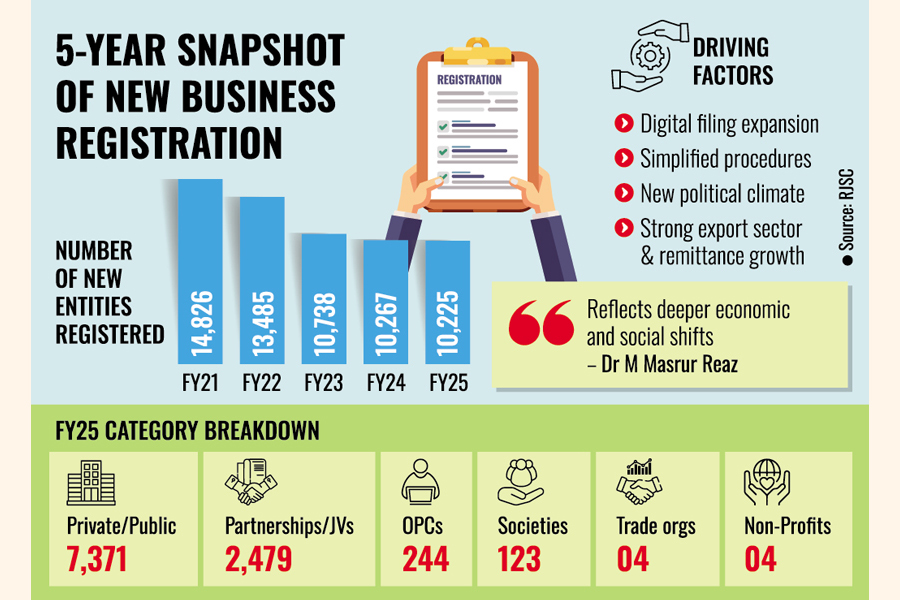Steady new business reg reflects resilience amid political shifts

Published :
Updated :

Despite political uncertainty and economic headwinds, Bangladesh saw a relatively steady trend in new business registrations in the just-ended fiscal year (FY 2024-25), suggesting a quiet but persistent confidence among entrepreneurs across sectors.
A total of 10,225 new firms and entities were registered with the Registrar of Joint Stock Companies and Firms (RJSC) during the year ending on June 30, 2025, compared to 10,267 in the previous fiscal, official data revealed.
Experts believe the consistent numbers mask underlying economic and political transitions that are gradually reshaping the country's business landscape.
The number of new business entities enrolled in Bangladesh in the fiscal year (FY) 2024-25 remained almost a steady trend in comparison with the previous year despite some political and macroeconomic concerns.
The new firms and entities got registered with the Registrar of Joint Stock Companies (RJSC) between July 1, 2024 and June 30, 2025.
Officials and experts attributed such a slower trend in the registration of new business entities to the country's latest political and administrative transitions.
Dr M Masrur Reaz, Chairman and CEO of Policy Exchange Bangladesh, said such steady trend in the registration of new firms reflects that deeper economic and social shifts are currently underway in the country.
"The export sector is doing very well, and backward linkages have strengthened significantly, increasing reliance on local supply chains," he said.
"At the same time, remittance has grown rapidly. That, combined with a transition to a more open, rights-oriented environment, may have encouraged many family members of remittance recipients to start businesses," said the economist.
He also observed that more business entities belonging to people of the BNP and Jamaat might have emerged during the period.
Dr Reaz added that the change in the political regime has also played a 'subtle' but important role in rural and semi-urban areas.
"Many entrepreneurs with allegiance to the then-opposition were under constraints before 5 August 2024. Now such barriers are gone, a good number of them have resumed or re-entered business," he said.
According to the five-year data of the RJSC, after showing a significant rise in the registration of new business entities in FY?2020-21 with 14,826, the number dropped to 13,485 in FY?2021-22 and fell more sharply to 10,738 in FY?2022-23.
However, the past two fiscal years saw signs of stabilisation, with only marginal year-on-year decreases.
In FY?2024-25, private and public companies registered under the Companies Act remained the dominant category with 7,371 new enrolments, reflecting a marginal 1.4 per cent drop from that of 7,479 the previous year.
In the fiscal there remained a sharp increase in One Person Companies (OPCs), a relatively new structure introduced to support individual entrepreneurs.
The number of OPCs registered with the RJSC rose to 244 in FY?2024-25, showing a 75.5 per cent increase from that of 139 in FY?2023-24.
Number of partnership or joint venture firms remained largely unchanged at 2,479 in the last fiscal, slightly down from the previous year's 2,483.
Such increase reflects continued reliance on this traditional business model by small and medium-sized enterprises, professional service providers, and family-run ventures, according to insiders.
However, enrollment of new business entities under some other categories saw a clear decline-the registration of societies dropped from 142 to 123, continuing a downward trend from 317 in FY?2020-21.
Registration of trade organisations fell to a five-year low of only four in the said fiscal year, from 15 in the previous year.
Similarly, only four non-profit companies got registered last fiscal under Section 28, compared to that of nine in the previous fiscal.
An RJSC official said the continued expansion of digital registration services played a key role in maintaining the volume of new filings.
"Our online platform has made the registration process more accessible and efficient, even in the midst of broader transitions," the official said.
"Initiatives taken by this government, including that of reforms and simplification of procedures, have positively influenced new firm registrations," he said.
The official also noted that the rise in OPCs and the steady enrollment trend in partnership firms suggest that entrepreneurs across sectors are adapting formal structures which better reflect their operational needs.
bdsmile@gmail.com


 For all latest news, follow The Financial Express Google News channel.
For all latest news, follow The Financial Express Google News channel.